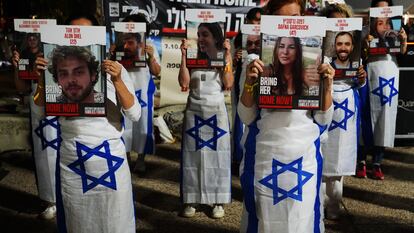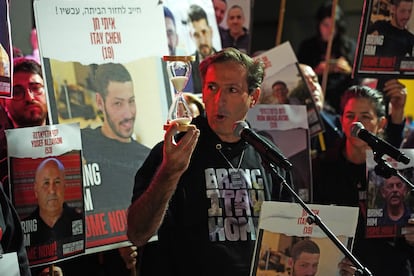Families of Hamas hostages pressure Netanyahu: ‘We don’t want them back in bags’
Israelis are incensed after IDF troops killed three hostages in the Strip on Friday, shouting ‘terrorists!’ as the captives waved a white flag

The three hostages were naked from the waist up, calling for help in Hebrew and waving a homemade white flag to make it clear they were turning themselves in. But even so, the Israeli army considered them a threat and shot them dead last Friday in northern Gaza, shouting “terrorists!” in what has become one of the blackest incidents on the Israeli side of the war. It comes, moreover, at a time of rising discontent among the families of the nearly 130 hostages remaining in the Strip — some of whom are already dead — due to what they consider a lack of commitment to bringing them back on the part of the government of Prime Minister Benjamin Netanyahu. The families have demanded that their loved ones are returned “alive and not in bags,” after a meeting held Saturday in Tel Aviv, following which they have issued a message to the war cabinet chaired by Netanyahu to make an immediate offer to exchange hostages for Palestinian prisoners, even those “with blood on their hands.”
Netanyahu on Saturday defended the way he is handling the war. “The military pressure is essential both for returning the hostages and achieving victory over our enemies,” he said in an appearance alongside Defense Minister Yoav Gallant, who accepted responsibility for the deaths of the three hostages.
Amid the scandal, the Israeli authorities are attempting to resume negotiations more vigorously than in previous days. They are doing so with internal and external meetings at the highest level, such as one scheduled to be held in Oslo between the head of Mossad — Israel’s foreign intelligence service — David Barnea, and the Prime Minister of Qatar, Sheikh Mohammed bin Abdulrahman Al Thani. Netanyahu refused to discuss it when asked in order not to give information to Hamas.
“Alon was my friend,” a grief-stricken Matan Sobol, 26, tells EL PAÍS, referring to Alon Shamriz, one of the three hostages. “It was terrible,” he adds, without wishing to blame anyone but allowing the idea to float in the air that soldiers in Gaza shoot at anything that moves. Along with Shamriz, the military took the lives of Yotam Haim, both kidnapped on October 7 from Kibbutz Kfar Aza, and Samer Al-Talalka, captured in neighboring Kibbutz Nir Am. The Israeli army acknowledged this week that more than 10% of fatalities among its soldiers in Gaza were the result of friendly fire.
“The government does not talk to the families,” said Rubi Chen, who last week was received with other family members in the U.S. by President Joe Biden. Upon his return, he called the Israeli government and was told that it would not meet with relatives. “I thought it was a joke,” added Chen, the father of a hostage and one of the spokesmen who made statements on Saturday in the square known as the Square of the Hostages and the Missing in Tel Aviv to express his discomfort after the meeting of the families and supporters of the hostages.
“We ask the War Cabinet to talk to the families and not to tell us that they are waiting for an offer from the U.S. or a call from someone else. The Israeli government has to put offers on the table, including prisoners with blood on their hands, put the best offer on the table to bring the hostages back alive,” he stressed. “We don’t want them back in bags. That requires them to move now,” Chen added, raising his voice and displaying an hourglass. Shortly afterward, it was announced that they were to be received by two members of the Cabinet, Benny Gantz and Gadi Eisenkot.
Friday’s incident occurred when a soldier observed the three “suspects” coming out of a building a few dozen meters away, according to a local press account from sources close to the investigation. That soldier believed, according to the same account, that they were Hamas militiamen setting a booby trap and immediately opened fire while shouting “terrorists!” to warn other soldiers in the area. Two of the hostages were killed by that soldier’s gunfire while the third tried to return to the building, wounded, as the battalion commander ordered the shooting to cease. The wounded man then began to call for help in Hebrew and came back out of the building, when he was shot and killed by another soldier. Despite the two soldiers breached protocols, the army noted that in recent days its troops have suffered several ambush attempts and attacks by suspected suicide bombers. The deaths of the three hostages took place in the Gaza City neighborhood of Shuhaiya, a known stronghold of the Palestinian armed resistance, near where an ambush earlier this week killed nine Israeli soldiers.
Sobol has not only lost his friend Alon. He holds a poster with the image of his cousins Ziv and Gali Berman, both 26, who remain captive in Gaza. “Knowing from the news that reached us from the family, that they waved a white flag and that they considered them a threat... I don’t doubt that the army is carrying out a tough job, they are trying by all means to get them out, but we ask the government to help us families to bring them back,” he said.
Defense Minister Gallant has held a meeting which, in addition to the Mossad chief, was attended by military and secret service officials “focused on efforts to return the hostages,” a ministry statement said.

“Those who were supposed to save them did not succeed”
Sobol wants to believe that deaths of the hostages are going to serve to change the way the army acts on the ground, or to the negotiation of a new ceasefire, but at the same time he recognizes that what happened “can happen in any combat or war. Those who were supposed to save them did not succeed, but, as I say, everything can change in just a few seconds.”
“We knew this was going to happen, because they have hostages everywhere and if the Hamas people are in danger, they either kill them or abandon them,” says Guy Levi, a 66-year-old sociologist and educator, in the renamed Tel Aviv square. “That’s why we implore for a ceasefire, but the government prefers to keep fighting because politics is more important to them than getting them out. Hostages are not on the agenda of the government, which only understands force and military power. Israel’s culture is a military culture,” he laments, looking at the images of two kidnapped friends printed on his T-shirt.
Under a tent in the square, which in recent weeks has been converted into an area of protest and memory, Levi openly criticizes the policy of the Netanyahu-led government, which, in his opinion, is more concerned with the “fascist settlers” than with those “abandoned in Gaza.” He angrily recalls October 7, and shows the digital calendar on his cell phone for that day. At 6 p.m., Kibbutz Nahal Oz was celebrating its 70th anniversary with a pool party. The event, barely 500 meters from the border fence that separates the community from Gaza, was authorized by Israeli military officials, he says indignantly. “I was spared from being there that morning because my mother died in August,” Levi says with a twisted expression, basing his view of the current conflict on the two one-month long missions he carried out in Lebanon in 1982, which led him to turn away from a way of acting that he often considers “immoral.” “The army has killed friends of mine in the West Bank,” he remarks. “It makes my blood boil. The happiest day will not be when Netanyahu resigns, no. It will be when they bury him.”
Sign up for our weekly newsletter to get more English-language news coverage from EL PAÍS USA Edition
Tu suscripción se está usando en otro dispositivo
¿Quieres añadir otro usuario a tu suscripción?
Si continúas leyendo en este dispositivo, no se podrá leer en el otro.
FlechaTu suscripción se está usando en otro dispositivo y solo puedes acceder a EL PAÍS desde un dispositivo a la vez.
Si quieres compartir tu cuenta, cambia tu suscripción a la modalidad Premium, así podrás añadir otro usuario. Cada uno accederá con su propia cuenta de email, lo que os permitirá personalizar vuestra experiencia en EL PAÍS.
¿Tienes una suscripción de empresa? Accede aquí para contratar más cuentas.
En el caso de no saber quién está usando tu cuenta, te recomendamos cambiar tu contraseña aquí.
Si decides continuar compartiendo tu cuenta, este mensaje se mostrará en tu dispositivo y en el de la otra persona que está usando tu cuenta de forma indefinida, afectando a tu experiencia de lectura. Puedes consultar aquí los términos y condiciones de la suscripción digital.









































